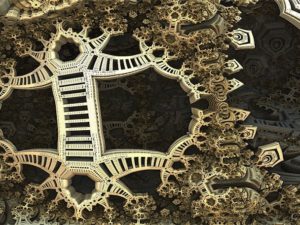
By Vajra Chandrasekera
My approach to the Sharkes is probably going to be less about the award per se―its Britishness, its ups and downs: I mean, I read and deeply enjoyed “Hull 0, Scunthorpe 3” like everybody else, but apart from that it’s all a bit distant and hazy from where I live, much like the various hullabaloos about the American awards—and more about using the award’s official submissions list as a frame for my reading.
Until relatively recently, the only SFF awards I knew were those mentioned on book covers: the Hugo, the Nebula, and the Clarke. The first Clarke winner I ever read was probably either The Handmaid’s Tale or Take Back Plenty, but those were older editions that didn’t mention it on the covers, so at that time I didn’t know. So the first time I realized there was such a thing as a Clarke Award was when I saw it on the cover of Paul McAuley’s Fairyland, the 1996 mass market paperback with the big blue face on the cover, with “Winner of the Arthur C. Clarke Award” on its forehead.
It’s almost funny that I hadn’t heard of the award by that time, given that Clarke was a local celebrity. If there were ever any local announcements of the original 1987 grant or of any of the subsequent winners, I missed it. I don’t think there were any, though. Things were a lot more disconnected in those days, and the award was firmly rooted somewhere else. And anyway, Clarke lived in a different version of Colombo than I did. A few years before I was born (and not long after Elizabeth II finally stopped being our head of state, nearly a quarter-century after independence from the Empire) the Sri Lankan government brought into law an entire new immigration status, the non-citizen Resident Guest, to accommodate Clarke personally. Apparently even as late as 1982 this was still being called “the Arthur Clarke Law,” which we might call that a fourth law on top of the better-known three already named for him (and the only one which is actual law.)
Looking back at the Clarke winners and nominees now, I recognize many of my fin de siècle favourites that don’t appear on the Hugo or Nebula lists of the same period: Eon, Use of Weapons, The Broken God, The Iron Dragon’s Daughter, Vurt. So in that sense, even though I didn’t follow any of the conversations at the time, it seems in retrospect one might say that my taste has always been closer to the Clarke than to the other awards.
But then this uncanny affinity is not mysterious. I read most of those books by borrowing them from the British Council library in Colombo, and it seems reasonable to assume their Clarke Award wins or nominations ensured that they were stocked. So perhaps it’s more accurate to say that my early taste in SFF was heavily influenced by the Clarke in the first place. Which seems a rather terrifying responsibility for those that end up on the actual juries. Who is to blame for me having read Vurt at seventeen, and everything that this led to? And so on. Which is why I appreciate that the shadow jury allows one the pleasure of reading and talking about books in public space, without being required to make terrible choices in camera that might affect the tastes of new generations of readers and writers to come.
*
Vajra Chandrasekera is a writer from Colombo, Sri Lanka, and a fiction editor at Strange Horizons. His short fiction has appeared in Black Static, Clarkesworld, and Lightspeed, among others. He blogs occasionally at vajra.me and can be found on Twitter at @_vajra.
1 Comment
Pingbacks
-
[…] Vajra Chandrasekera signs in to the proceedings with a self-introduction: […]


